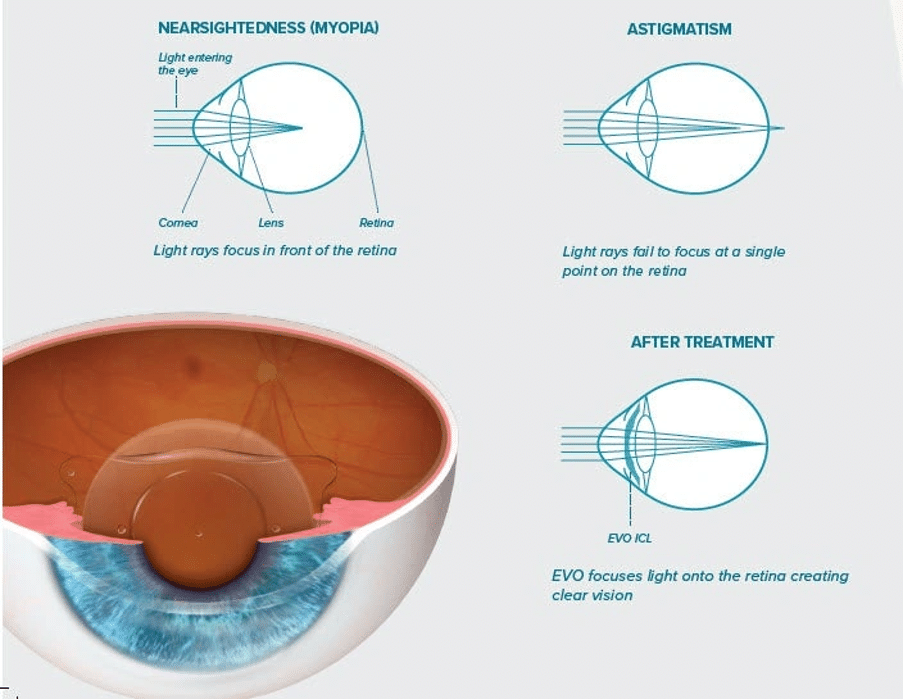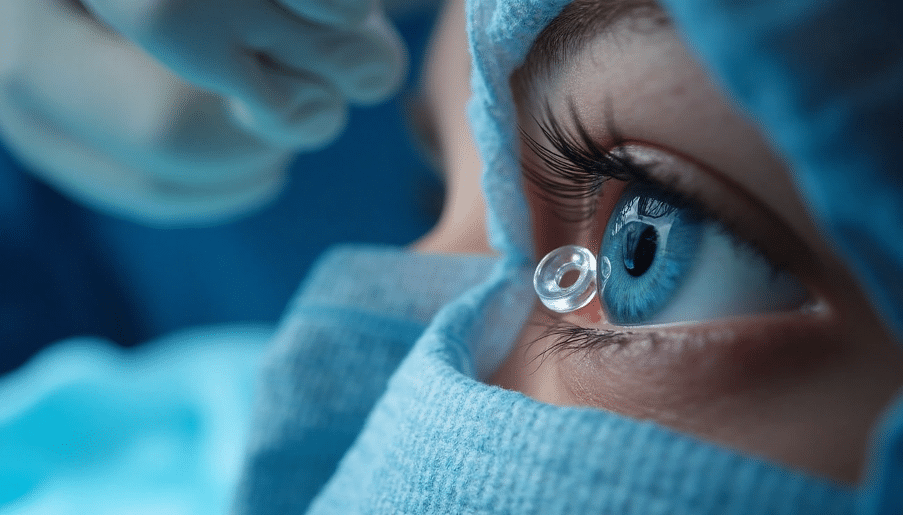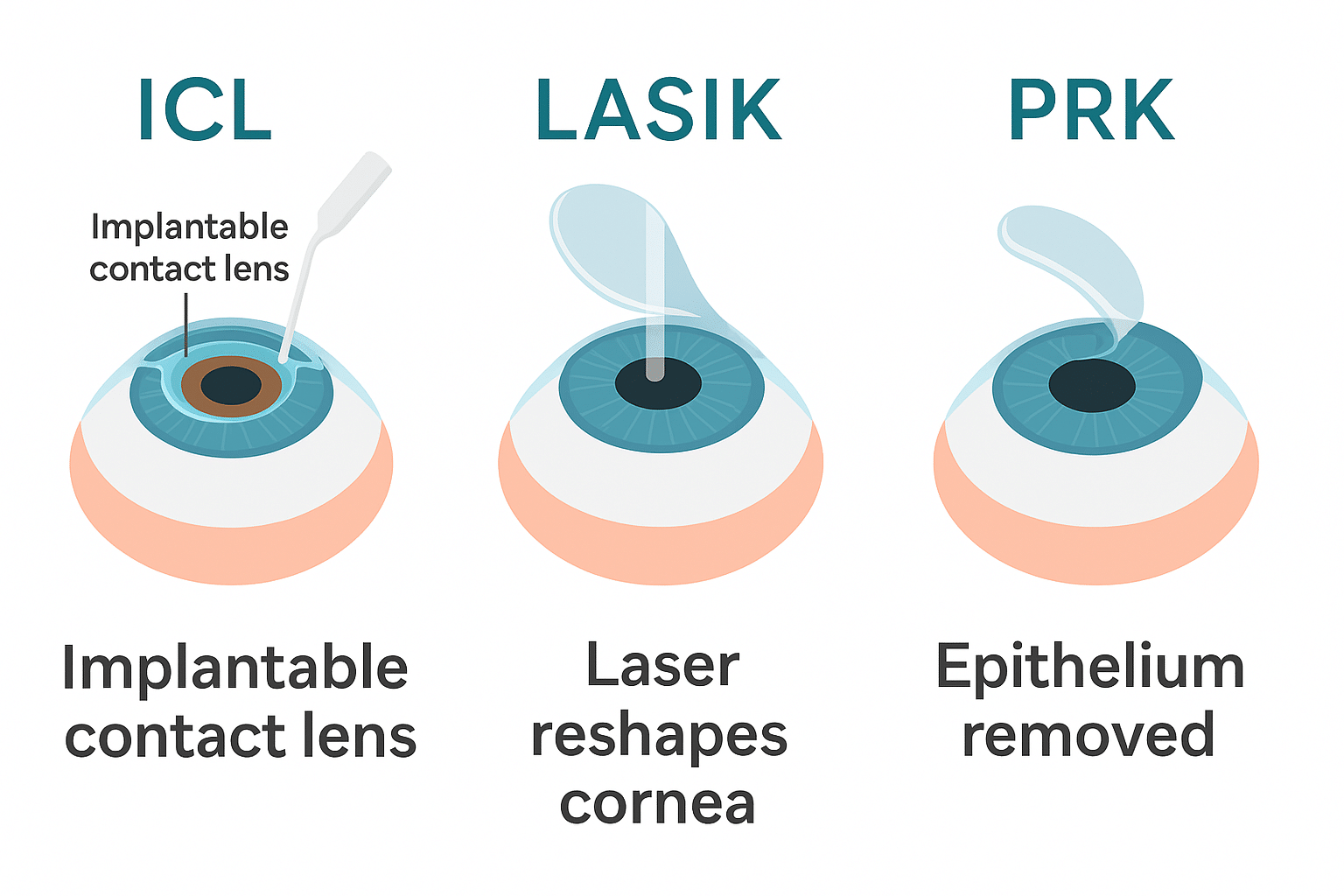Did you know that implantable contact lenses have improved the vision of over 3,000,000 people worldwide? EVO ICL surgery has become the preferred vision correction option for many people in the UK, with an impressive 95% satisfaction rate and 99.4% of patients who would choose the procedure again. This innovative procedure takes just 20-30 minutes and can correct prescriptions ranging from -0.5D to -20D. Unlike LASIK, implantable contact lenses preserve your cornea’s natural shape, making them especially suitable for patients with thin corneas or dry eye syndrome.
Surgeons place the EVO ICL lens behind your iris and in front of your eye’s natural lens through a small incision. The procedure is especially appealing because patients experience major vision improvement almost right after surgery, and recovery time is minimal. This piece will help you understand everything about implantable contact lenses in the UK if you’re between 21 and 60 years old and looking for a life-changing vision correction, especially if you have a higher than average prescription.
Understanding the EVO ICL Lens

Image Source: Spindel Eye Associates
The EVO ICL (Implantable Collamer Lens) stands out as one of the most important breakthroughs in vision correction technology. Let me explain how its makeup, function, and compatibility with certain eye conditions make it a great alternative to traditional laser eye surgery.
What is EVO ICL made of?
EVO ICL uses Collamer, a unique biocompatible material created specifically for ocular implants. This special material combines hydroxyethyl methacrylate (HEMA) and porcine collagen to create a lens that works naturally with your eye’s physiology. The lens has approximately 60% poly-HEMA, 36% water, 3.8% benzophenone, and 0.2% porcine collagen.
Collamer’s magic lies in how well it works with the human eye. The lens contains collagen—a protein your body naturally produces—so your immune system sees it as part of your eye rather than something foreign. The material also protects your eyes from harmful UV rays that could lead to eye problems.
How it improves vision
The EVO ICL sits between your iris (the coloured part of your eye) and your natural lens. This perfect placement lets the lens correct vision problems precisely without changing your eye’s natural structure.
The lens design features a plate-haptic structure with a central convex/concave optical zone and a 0.36mm central port that helps aqueous fluid flow naturally. This setup maintains normal eye function while delivering great results. Research shows that over 99% of patients achieve 20/40 or better vision, and about 90% reach 20/20 or better. EVO ICL can correct a wide range of prescriptions—from -3.0D to -20.0D of myopia (nearsightedness) and up to 4.0D of astigmatism. Patients often report better night vision with fewer issues like halos and glare compared to laser vision correction.
Why it’s suitable for thin corneas and dry eyes
Unlike LASIK which removes corneal tissue to reshape the eye, EVO ICL adds to your eye’s natural structure while keeping your cornea intact. This makes it perfect if you have thin corneas and can’t get laser procedures.
The procedure doesn’t disturb corneal nerves, so it won’t cause or worsen dry eye syndrome. This benefit helps patients who already have dry eyes or worry about this common post-LASIK issue. Recovery times are shorter and complications are fewer compared to procedures that change corneal tissue because of its minimally invasive approach.
Is EVO ICL Right for You?

Image Source: Optical Illusions
Several factors determine if EVO ICL will work for your vision needs. This advanced procedure gives remarkable vision correction results, but your eye’s characteristics will decide if you qualify.
Prescription and eye health requirements
Your prescription should fall within specific ranges to be eligible for EVO ICL. The procedure corrects nearsightedness between -0.5D and -20D and astigmatism from 0.5D to 4.0D. Some clinics treat farsightedness ranging from +0.5D to +10.0D. Your prescription needs to be stable with minimal change (less than 0.5D) in the last year.
Age is a vital factor—most candidates are between 21 and 45 years old, though some specialists might accept patients up to 60. Your eye’s anterior chamber depth must be adequate (typically greater than 3.00mm) to fit the implantable contact lenses safely. Healthy eyes are essential. You should not have conditions like glaucoma, cataracts, uveitis, or severe dry eye syndrome.
Who should avoid the procedure
EVO ICL isn’t right for everyone, and with good reason too. Women who are pregnant or nursing should wait until their hormone levels stabilise. People with narrow anterior chamber angles don’t have enough space for the lens.
Alternative solutions might work better if you have chronic eye infections, inflammation, keratoconus, or previous eye surgeries. Systemic conditions that affect healing, such as uncontrolled diabetes, might also make you ineligible. Other procedures might suit you better if you have mild nearsightedness. People over 45 might benefit more from alternatives like Refractive Lens Exchange.
How to know if you’re a good candidate
A complete eye examination will tell you if EVO ICL suits you. The best candidates often have moderate to severe nearsightedness, thin corneas that rule out LASIK, or they tend to develop dry eye syndrome.
Ready to explore EVO ICL surgery? Schedule a personal consultation with our leading eye surgeons in London and start your journey toward crystal-clear vision. The evaluation looks at your eye’s structure in detail, checks your corneal health, and reviews your medical history. This all-encompassing approach will give a suitable recommendation that matches your vision needs.
Your Surgery Journey: From Consultation to Clear Vision
The trip to better vision through EVO ICL starts before your surgery day. Your path from the original consultation to improved vision follows a well-laid-out process that ensures the best results.

Original assessment and planning
Your EVO ICL trip starts with a consultation that typically lasts about 90 minutes. Your doctor’s detailed testing includes corneal tomography scanning, pupil measurements, and a full examination of your retina. These tests determine if your eyes qualify for implantable contact lenses.
The consultation costs £300, which you pay at the time of booking. This fee is non-refundable. Your surgeon will discuss your eligibility and suggest the best lens type based on your needs.
The cost varies depending on your prescription:
- Simple Lens (distance correction without astigmatism): £3,650 per eye
- Myopic Specialist Lens (for short-sighted patients with astigmatism): £4,050 per eye
- Hyperopic Specialist Lens (for long-sighted patients with astigmatism): £4,300 per eye
- Specialist Keratoconus ICL Lens: £4,500 per eye
You need to pay a deposit of £1,250 per eye to reserve your treatment. This amount comes off the final cost.
Surgery day: what happens step-by-step
Someone needs to drive you home after your surgery. Your surgeon starts with dilating eye drops and numbing drops that keep you comfortable. Most clinics provide mild sedation to help you stay relaxed.
The procedure takes just 20-30 minutes. You lie on your back while your surgeon creates a small opening in your cornea. A special delivery device inserts the folded EVO ICL through this tiny incision. The lens unfolds into position behind your iris and in front of your natural lens. Your surgeon doesn’t remove any tissue during this procedure.
Post-surgery care and vision improvement timeline
Your vision stays blurry for a few hours to two days after surgery. Notwithstanding that, many patients see better within hours of the procedure. You get eye drops to prevent infection and inflammation that you use for several days.
You see your doctor the day after surgery. Additional check-ups happen at one week, one month, and three months after surgery. Most people return to work within 1-2 days. Stay away from rubbing your eyes, swimming, and heavy activities for at least a week during recovery. Your vision keeps improving and stabilises over the first month. Complete healing takes 1-2 months.
Ready to explore EVO ICL surgery? Book a personalised consultation with our prominent eye surgeons in London and start your trip toward crystal-clear vision.
Comparing EVO ICL to Other Vision Correction Options

Understanding how each vision correction procedure meets your specific needs helps you make the right choice. Let’s get into how implantable contact lenses stack up against other popular options.
EVO ICL vs LASIK
Both procedures want to help you rely less on glasses, but they work quite differently. LASIK removes tissue to reshape your cornea. EVO ICL adds a biocompatible lens that keeps your corneal structure intact. This crucial difference makes EVO ICL the better choice for patients with thin corneas who can’t get LASIK.
EVO ICL corrects higher levels of nearsightedness (up to -20 diopters) while LASIK typically stops at -10 diopters. Patients with severe myopia might find implantable contact lenses their only surgical choice.
Visual improvement comes quickly with both procedures. LASIK patients often deal with dry eye symptoms that EVO ICL patients usually avoid. The cost difference is significant – LASIK ranges from £1,588 to £2,382 per eye, while EVO ICL costs £3,650 to £4,500 per eye.
EVO ICL vs PRK
PRK changes corneal tissue by completely removing the epithelium instead of creating a flap like LASIK. EVO ICL needs just a tiny incision to place the lens. Recovery time varies significantly between procedures. PRK takes several months to heal fully, while EVO ICL patients typically recover within a week. Both procedures work well to correct nearsightedness and astigmatism. EVO ICL stands out for patients worried about corneal thickness since it preserves all corneal tissue. This preservation keeps your future vision correction options open.
EVO ICL vs contact lenses
Daily contact lenses need constant handling, cleaning, and replacement. EVO ICL offers a permanent yet removable solution that eliminates these daily tasks. They provides constant UV protection and removes risks linked to poor contact lens hygiene, which affects more than 80% of young contact lens wearers.
EVO ICL’s upfront cost starts at £3,650 per eye. This might seem expensive compared to contact lenses, but the long-term value often makes more sense when you add up lifetime costs of traditional contacts. Ready to explore EVO ICL surgery? Our leading London eye surgeons offer tailored consultations to help you achieve crystal-clear vision.
Conclusion
Making the Decision: Is EVO ICL Your Path to Clear Vision?
EVO ICL surgery stands out as a remarkable vision correction option, especially when you have a high prescription or thin corneas. This piece explores how this innovative procedure offers many advantages over traditional vision correction methods. Unlike LASIK or PRK, implantable contact lenses preserve your corneal tissue completely and deliver exceptional visual outcomes.
Of course, cost plays a crucial role as you think about your options. The investment begins with a £300 consultation fee. Procedure costs range from £3,650 per eye for simple lens correction to £4,500 per eye for specialist keratoconus ICL lenses. The upfront expense exceeds conventional contact lenses or glasses, but many patients see the long-term benefits as worth the investment. Note that you’ll need a £1,250 deposit per eye to book your procedure, which gets deducted from the final cost.
Most clinics recommend annual check-ups after your recovery to ensure your lens performs optimally and maintains eye health. These follow-up appointments help maintain your vision quality as the years pass. EVO ICL offers life-changing benefits to suitable candidates. The quick 20-30 minute procedure improves your vision almost immediately with minimal recovery time. The lens material also works in harmony with your eye’s natural physiology, which reduces complications like dry eye that often occur with laser procedures.
A detailed consultation with a qualified ophthalmologist should be your first step. This assessment will help you find out if your eye structure, prescription, and overall health make you an ideal candidate for this transformative procedure.
The convenience, effectiveness, and lasting results compared to other vision correction options make EVO ICL without doubt a compelling choice for many UK patients who want freedom from glasses and contact lenses. The impressive 95% satisfaction rate shows the life-changing potential of this procedure. Your trip toward clear, unassisted vision might be just a consultation away. Take the next step to find if EVO ICL could be the permanent vision solution you’ve been looking for.
FAQs
Q1. What is EVO ICL surgery and how does it work? EVO ICL surgery involves implanting a biocompatible lens between the iris and natural lens to correct vision. The procedure takes about 20-30 minutes and can correct prescriptions ranging from -0.5D to -20D, making it suitable for those with high prescriptions or thin corneas.
Q2. How long does it take to recover from EVO ICL surgery? Most patients experience significant vision improvement within hours of the procedure. Full recovery typically takes 1-2 months, with many people returning to work within 1-2 days. Follow-up appointments are scheduled at one day, one week, one month, and three months post-surgery.
Q3. Is EVO ICL surgery painful? The procedure is generally painless. Numbing eye drops are administered before surgery, and some clinics offer mild sedation to help patients relax. After surgery, you may experience some discomfort, but this is usually manageable with prescribed eye drops.
Q4. How much does EVO ICL surgery cost in the UK? The cost varies depending on your prescription. Simple lens correction starts at £3,650 per eye, while specialist lenses for astigmatism or keratoconus can cost up to £4,500 per eye. There’s also a £300 consultation fee. A deposit of £1,250 per eye is required when booking the procedure.
Q5. How does EVO ICL compare to LASIK? Unlike LASIK, EVO ICL doesn’t remove corneal tissue, making it suitable for those with thin corneas. EVO ICL can correct higher levels of nearsightedness (up to -20 diopters) compared to LASIK (typically up to -10 diopters). EVO ICL patients generally experience fewer dry eye symptoms post-surgery, but the procedure is more expensive than LASIK.
Authors & Reviewer
-
 Olivia: Author
Olivia: AuthorHi, I'm Olivia, a passionate writer specialising in eye care, vision health, and the latest advancements in optometry. I strive to craft informative and engaging articles that help readers make informed decisions about their eye health. With a keen eye for detail and a commitment to delivering accurate, research-backed content, I aim to educate and inspire through every piece I write.
-
 Dr. CT Pillai: Reviewer
Dr. CT Pillai: ReviewerDr. CT Pillai is a globally recognised ophthalmologist with over 30 years of experience, specialising in refractive surgery and general ophthalmology. Renowned for performing over 50,000 successful laser procedures.

